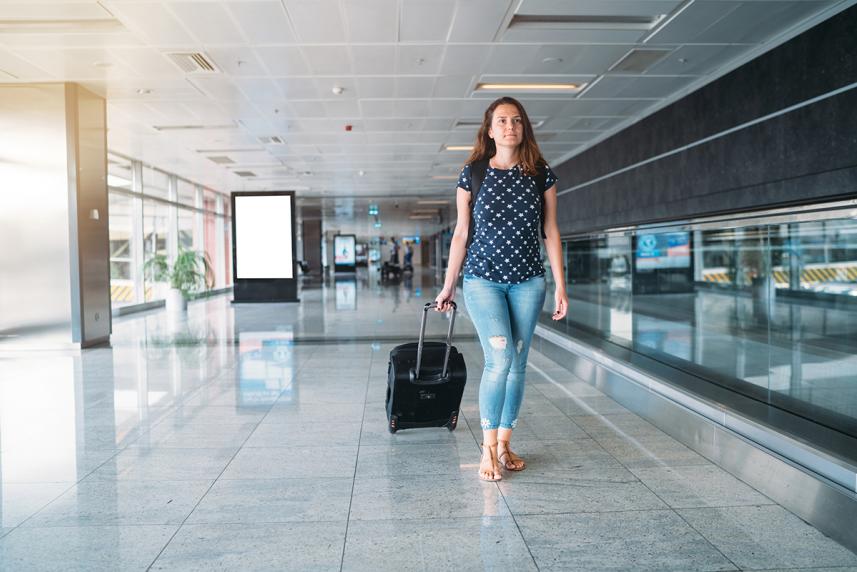
How to prevent jet lag

Flying to a different time zone can mess with your sleep. Here’s what you need to know — and do — before you take off on your next trip.
Are you taking a trip across the country (or abroad) this summer? Traveling to a different time zone can leave you feeling tired, fuzzy-headed and out of sorts. You want to nap in the middle of the day. Or you lie in bed awake at night when everyone else is snoozing.
But you can take steps to deal with jet lag and get your sleep schedule back on track. First, let’s break down what jet lag is and why it happens.
What causes jet lag?
“We all have a natural rhythm called a circadian rhythm that’s ruled by the sun,” says Robin MacFarlane, PhD. She’s a sleep psychologist based in New York City. Your circadian rhythm is an internal body clock of sorts. It signals when it’s time to go to bed and wake up based on when the sun sets and rises where you live.
When you fly across time zones, your circadian rhythm gets thrown off. Suddenly, your body must deal with a new sleep-wake schedule that it’s not used to (cue the confusion). The more time zones you cross, the more likely you are to feel it. And it can take time for your body clock to reset to this new schedule.
The most common symptoms of jet lag include:
- Intense fatigue
- Difficulty staying alert
- Trouble concentrating
- Gastrointestinal problems
How long can it last?
The greater the time difference between your home and destination, the longer it’ll likely take to adjust, MacFarlane says. If you’re traveling from New York to Chicago, for instance, you cross a single time zone. (Chicago is an hour behind New York.) When you fly from New York to Los Angeles, you go through 3 time zones. “You can expect to need about 1 day of adjustment for each time zone crossed,” says MacFarlane.
Direction matters, too. “Jet lag tends to be worse when you’re traveling east than when you’re traveling west,” says Sanjeev Kothare, MD. He’s the co-director of the pediatric sleep program at Cohen Children’s Medical Center in New York City. That’s because it’s harder for your internal clock to jump forward than fall back.
Say you fly from New York to London, which is 5 hours ahead. You might leave in the evening and arrive in London at 8 a.m. But on your body clock, it’s really 3 a.m. — and you’ll still want to be asleep even though it’s morning. The good news: On the trip home, jet lag should be easier to deal with.
What can you do to minimize jet lag?
Here are some things you can try before and during your trip to make the experience less awful.
Do some advance prep. Slowly shifting your sleep time prior to your trip can help you adjust to the new time zone, notes MacFarlane. If you’re traveling west, head to bed 30 minutes earlier than usual each day for a couple of days before you’re set to take off. Heading east? Then shift your bedtime so that it’s 30 minutes later every day for several days.
Consider melatonin. This is a hormone your body makes that helps you feel sleepy as bedtime draws near. Very little melatonin is produced during the day, but higher amounts get pumped out in the evening. This starts several hours before bedtime, according to the Mayo Clinic.
But you can also find melatonin in supplement form. And it can be effective for a short-term sleeping problem such as jet lag. Taking melatonin also may improve sleep quality and increase total sleep time.
Melatonin doesn’t necessarily make you fall asleep, but it can signal to your brain, “Hey, night’s coming,” MacFarlane says. “There is some evidence that melatonin helps shift your schedule to adjust to a new time zone.”
The best time to take melatonin is 4 or 5 hours before your desired bedtime in your new time zone.
You can find sleep essentials for traveling at the Optum Store. From melatonin to sleep buds, we have you covered.
Live like a local. Consider adopting your new schedule right away. Don’t go to bed until it’s nighttime in your new time zone, even if you’re exhausted when you get in. And get up at your usual time in the morning. Eat meals according to local time, too. It might feel rough at first, but it can help you adjust more quickly.
Follow the sun. Natural light sets your sleep-wake cycle. If you’d like to go to bed later to adjust to a new time zone, limit sunlight exposure early in the day. Then seek it out in the afternoon.
If your goal is to wake up earlier, getting some bright sunlight early in the day — and limiting the amount you get in the afternoon — is the better option. “This will help push your bedtime by tricking your brain into thinking it’s later or earlier in the day than it really is,” MacFarlane explains.
Try not to nap. It can be tempting to dive into bed during the day when you’re jet-lagged. But a nap can actually interfere with your sleep at night — not exactly what you’re going for.
If you truly can’t keep your eyes open, take no more than a 30-minute nap. And aim to do it between 1 and 3 p.m., says Joshua Tal, PhD. He’s a New York City-based clinical psychologist who specializes in treating sleep problems. Timing your nap right and keeping it short can help lessen the impact on your z’s when you finally do turn in.
You can’t totally avoid jet lag. But with these strategies, you should feel more alert when you arrive. And that means you can start enjoying your vacation sooner.

Additional source
Melatonin levels: Mayo Clinic (n.d.). “Jet lag disorder”